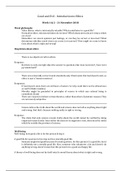Good and Evil - Introduction to Ethics
Week 1 & 2 – 21 November 2018
Moral philosophy
﮲Value theory: what is intrinsically valuable? What contributes to a good life?
﮲Normative ethics: what moral duties do we have? Which character traits are virtues, which
are vices?
﮲Metaethics: are moral opinions just feelings, or can they be correct or incorrect? What
determines whether moral views are correct or incorrect? How might we come to know
facts about what is right and wrong?
Skepticism about ethics
﮲ There is no objective truth in ethics.
Response:
﮲But there is only one right objective answer to questions like: does God exist? / how were
pyramids built?
﮲ There are universally correct moral standards only if God exists. But God doesn’t exist, so
ethics is just a ‘human construct’.
Responses:
﮲If God doesn’t exist, there are still laws of nature. So why could there not be ethical laws
as well? (Shafer-Landau)
﮲Morality might be grounded in principles of reason to which any rational being is
committed. (Kant)
﮲There are reasons to believe certain theories, rather than others. Epistemic reasons. They
are not merely subjective.
﮲ Science tells us the truth about the world and science does not tell us anything about right
and wrong. And that’s because nothing really is right or wrong.
Response:
﮲The claim that only science reveals truths about the world cannot be verified by doing
empirical research only. Since either the claim or its negation is true, there must be truths
which lie outside the province of science.
Well-being
Well-being: how good a life is for the person living it
A good life for a person to live may not be a morally good life.
Someone might feel good because of torturing others, for this person it’s a good life, but it
is definitely not a morally good life. Also, someone who volunteers a lot and doesn’t do
anything wrong, doesn’t mean that this person lives a good and happy life.
A theory of well-being does not by itself entail a moral theory about what is right and wrong.
,Useful distinction
1. Instrumental value – the value something has because of other things it enables you to
achieve (money, estate agencies, etc.)
2. Intrinsic value – the value something has in itself, independent of its effects.
Hedonism
Some philosophers think that only happiness intrinsically contributes to well-being
Desire satisfaction theory
Others think that only the satisfaction of desires contributes to well-being
Objective list theory
Yet others think that a variety of things intrinsically contribute to well-being
Hedonism
DEFINITION: The only thing that intrinsically enhances a person’s well-being is happiness, and
the only thing that intrinsically diminishes a person’s well-being is unhappiness.
Some philosophers associated with hedonism:
Jeremy Bentham / John Stuart Mill / Fred Feldman
Shafer-Landau takes happiness to be an attitude of enjoyment, taking pleasure in something.
One can take pleasure both in physical experiences (like lying in bath), but also in reading books
or working hard.
Advantages of hedonism
The claim that happiness improves a person’s life/well-being is very plausible
Hedonism can explain why different kinds of lives can be good for the people living them.
Disadvantages of hedonism
What if happiness is based on false beliefs?
e.g. You’re happy in your relationship, but your partner cheats on you without you
knowing. = false belief of your relationship
When you find out that your partner has cheated on you for 15 years, you might say that
these 15 years are wasted, even though you were happy at that time. This might show that
happiness is not the only things that counts.
What if happiness results from manipulation or coercion?
Is a life with a downwards happiness-trajectory as good as a life with an upwards trajectory?
Fred Feldman
Interested in the question what makes a life good for the person living it.
Defends a version of hedonism, which he loosely describes as the view that ‘what makes a person’s
life go well is that he enjoys what he gets’.
Pleasure as a feeling vs pleasure as an attitude
, Some people think of pleasure as a bodily feeling or sensation (Sensory pleasure)
Feldman says that sensory pleasures are feelings that we typically like.
Feelings have a felt quality, and (typically) a location.
Attitudinal pleasure
In Feldman’s view the kind of pleasure relevant to well-being is attitudinal pleasure.
Attitudinal pleasure is distinct from sensory pleasure in that it has no obvious location and takes
a state of affairs as object. It is pleasure taken in some (presumed) fact or state of affairs (such as
the fact that the lecture is interesting)
Question: does attitudinal pleasure feel a certain way? If not, does it make sense to speak of the
intensity of an attitudinal pleasure?
The evaluation of lives
The question whether someone’s life was good for the person living it is distinct from the question
whether that life contributed much to the welfare of others (extrinsic goodness) or was morally
good.
Sensory hedonism
The view that a person’s well-being is determined solely by the amount of sensory pleasure minus
the amount of sensory pain it contains.
Feldman believes this is false, because of Stoicus, who enjoys peace and quiet and the absence of
sensory pleasures and pains. Intuitively, Stoicus has a good life, but sensory hedonism cannot
account for that. Attitudinal hedonism can.
Attitudinal hedonism
Suppose we assign numerical values to attitudinal pleasures on the basis of their duration and
intensity, and negative numbers of pains
We might then say that the (welfare-)value of a person’s life is the sum, for all attitudinal pleasures
and pains experienced in that life, of those numbers.
Intrinsic attitudinal hedonism
We might call the resulting view IAH
IAH holds that a person’s well-being is determined by the total amount of intrinsic attitudinal
pleasure minus intrinsic attitudinal pain.
X enjoys many sensory pleasures and very few sensory pains.
Was X’s life good according to attitudinal hedonism?
Is happiness possible without the experience of pain? Are they dependent?
Objections to hedonism
Deceived businessman
Suppose one takes lots of intrinsic attitudinal pleasure in states of affairs that do not obtain. Is
one’s life as good as that of a person who takes lots of intrinsic attitudinal pleasure in states of
affairs that actually exist?
Responses:
Week 1 & 2 – 21 November 2018
Moral philosophy
﮲Value theory: what is intrinsically valuable? What contributes to a good life?
﮲Normative ethics: what moral duties do we have? Which character traits are virtues, which
are vices?
﮲Metaethics: are moral opinions just feelings, or can they be correct or incorrect? What
determines whether moral views are correct or incorrect? How might we come to know
facts about what is right and wrong?
Skepticism about ethics
﮲ There is no objective truth in ethics.
Response:
﮲But there is only one right objective answer to questions like: does God exist? / how were
pyramids built?
﮲ There are universally correct moral standards only if God exists. But God doesn’t exist, so
ethics is just a ‘human construct’.
Responses:
﮲If God doesn’t exist, there are still laws of nature. So why could there not be ethical laws
as well? (Shafer-Landau)
﮲Morality might be grounded in principles of reason to which any rational being is
committed. (Kant)
﮲There are reasons to believe certain theories, rather than others. Epistemic reasons. They
are not merely subjective.
﮲ Science tells us the truth about the world and science does not tell us anything about right
and wrong. And that’s because nothing really is right or wrong.
Response:
﮲The claim that only science reveals truths about the world cannot be verified by doing
empirical research only. Since either the claim or its negation is true, there must be truths
which lie outside the province of science.
Well-being
Well-being: how good a life is for the person living it
A good life for a person to live may not be a morally good life.
Someone might feel good because of torturing others, for this person it’s a good life, but it
is definitely not a morally good life. Also, someone who volunteers a lot and doesn’t do
anything wrong, doesn’t mean that this person lives a good and happy life.
A theory of well-being does not by itself entail a moral theory about what is right and wrong.
,Useful distinction
1. Instrumental value – the value something has because of other things it enables you to
achieve (money, estate agencies, etc.)
2. Intrinsic value – the value something has in itself, independent of its effects.
Hedonism
Some philosophers think that only happiness intrinsically contributes to well-being
Desire satisfaction theory
Others think that only the satisfaction of desires contributes to well-being
Objective list theory
Yet others think that a variety of things intrinsically contribute to well-being
Hedonism
DEFINITION: The only thing that intrinsically enhances a person’s well-being is happiness, and
the only thing that intrinsically diminishes a person’s well-being is unhappiness.
Some philosophers associated with hedonism:
Jeremy Bentham / John Stuart Mill / Fred Feldman
Shafer-Landau takes happiness to be an attitude of enjoyment, taking pleasure in something.
One can take pleasure both in physical experiences (like lying in bath), but also in reading books
or working hard.
Advantages of hedonism
The claim that happiness improves a person’s life/well-being is very plausible
Hedonism can explain why different kinds of lives can be good for the people living them.
Disadvantages of hedonism
What if happiness is based on false beliefs?
e.g. You’re happy in your relationship, but your partner cheats on you without you
knowing. = false belief of your relationship
When you find out that your partner has cheated on you for 15 years, you might say that
these 15 years are wasted, even though you were happy at that time. This might show that
happiness is not the only things that counts.
What if happiness results from manipulation or coercion?
Is a life with a downwards happiness-trajectory as good as a life with an upwards trajectory?
Fred Feldman
Interested in the question what makes a life good for the person living it.
Defends a version of hedonism, which he loosely describes as the view that ‘what makes a person’s
life go well is that he enjoys what he gets’.
Pleasure as a feeling vs pleasure as an attitude
, Some people think of pleasure as a bodily feeling or sensation (Sensory pleasure)
Feldman says that sensory pleasures are feelings that we typically like.
Feelings have a felt quality, and (typically) a location.
Attitudinal pleasure
In Feldman’s view the kind of pleasure relevant to well-being is attitudinal pleasure.
Attitudinal pleasure is distinct from sensory pleasure in that it has no obvious location and takes
a state of affairs as object. It is pleasure taken in some (presumed) fact or state of affairs (such as
the fact that the lecture is interesting)
Question: does attitudinal pleasure feel a certain way? If not, does it make sense to speak of the
intensity of an attitudinal pleasure?
The evaluation of lives
The question whether someone’s life was good for the person living it is distinct from the question
whether that life contributed much to the welfare of others (extrinsic goodness) or was morally
good.
Sensory hedonism
The view that a person’s well-being is determined solely by the amount of sensory pleasure minus
the amount of sensory pain it contains.
Feldman believes this is false, because of Stoicus, who enjoys peace and quiet and the absence of
sensory pleasures and pains. Intuitively, Stoicus has a good life, but sensory hedonism cannot
account for that. Attitudinal hedonism can.
Attitudinal hedonism
Suppose we assign numerical values to attitudinal pleasures on the basis of their duration and
intensity, and negative numbers of pains
We might then say that the (welfare-)value of a person’s life is the sum, for all attitudinal pleasures
and pains experienced in that life, of those numbers.
Intrinsic attitudinal hedonism
We might call the resulting view IAH
IAH holds that a person’s well-being is determined by the total amount of intrinsic attitudinal
pleasure minus intrinsic attitudinal pain.
X enjoys many sensory pleasures and very few sensory pains.
Was X’s life good according to attitudinal hedonism?
Is happiness possible without the experience of pain? Are they dependent?
Objections to hedonism
Deceived businessman
Suppose one takes lots of intrinsic attitudinal pleasure in states of affairs that do not obtain. Is
one’s life as good as that of a person who takes lots of intrinsic attitudinal pleasure in states of
affairs that actually exist?
Responses:











